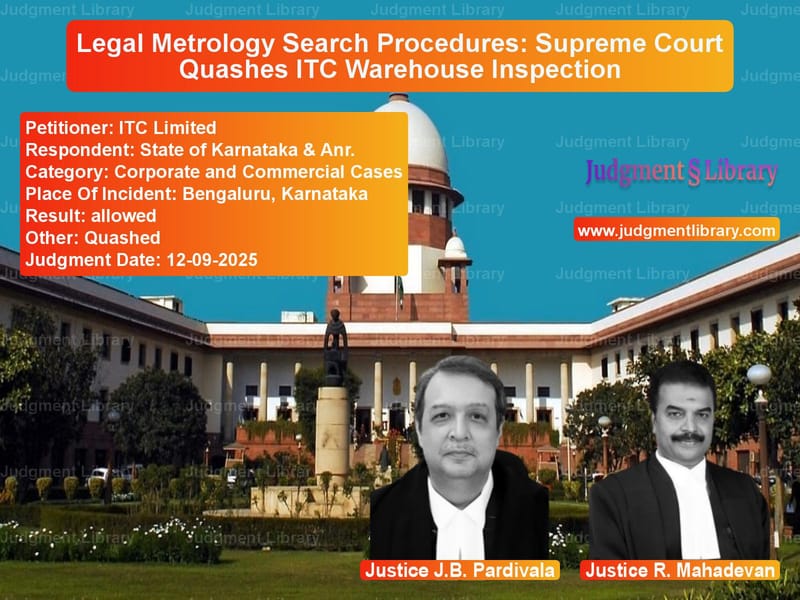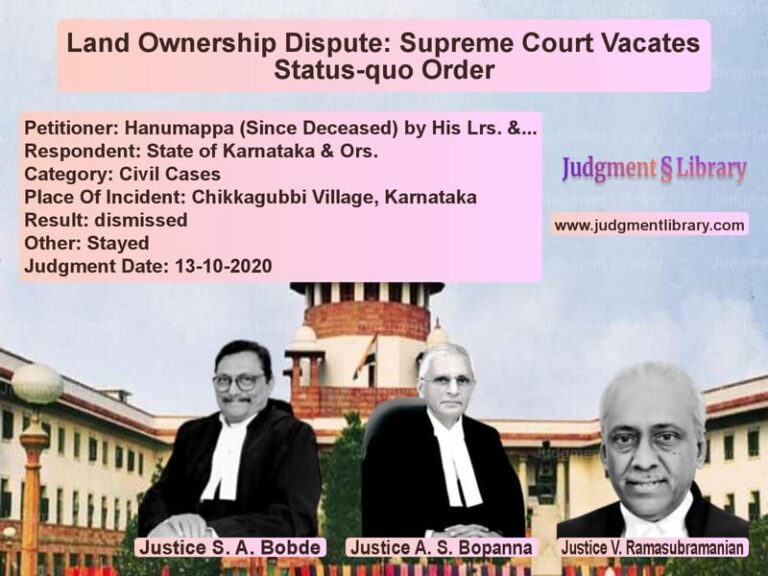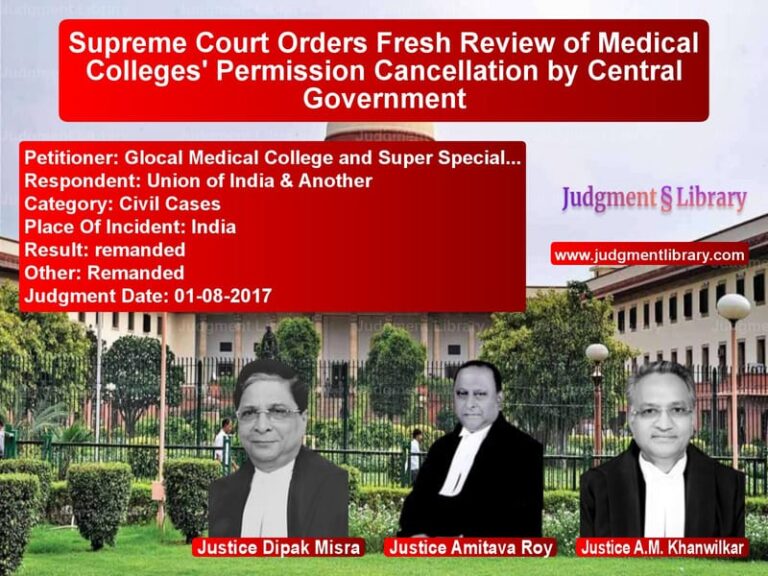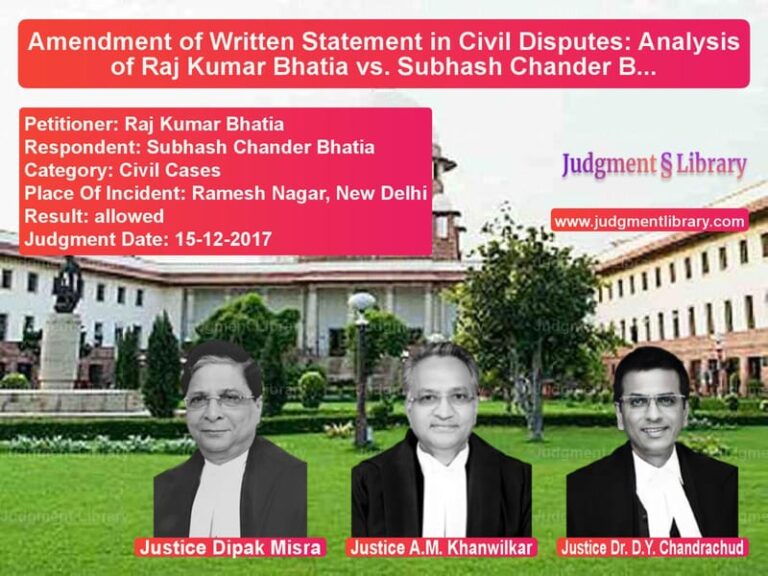Legal Metrology Search Procedures: Supreme Court Quashes ITC Warehouse Inspection
In a landmark judgment that reinforces the importance of procedural safeguards during government inspections, the Supreme Court of India has delivered a significant ruling protecting businesses from arbitrary search and seizure operations. The case involved ITC Limited, one of India’s leading conglomerates, and the Karnataka State Legal Metrology Department, centering around whether government authorities can conduct searches and seizures without following due process of law. The court’s decision has far-reaching implications for how regulatory inspections must be conducted, balancing the need for consumer protection with the rights of businesses to be protected from arbitrary state action.
The dispute began on July 2, 2020, when officials from the Karnataka Legal Metrology Department conducted an inspection at ITC’s warehouse in Bengaluru. During this inspection, the authorities seized 7,600 packages of ‘Classmate’ exercise books, alleging violations of Rule 24(a) of the Legal Metrology (Packaged Commodities) Rules, 2011. The department claimed that the packages lacked mandatory declarations required under the law. Simultaneously with the seizure, the department issued both a seizure notice and a compounding notice to ITC, essentially giving the company an ultimatum to either pay a compounding fee or face legal proceedings.
ITC immediately challenged these actions before the Karnataka High Court, arguing that the search and seizure were conducted without jurisdiction and in violation of established legal procedures. The company’s primary contention was that the officials had entered their premises without obtaining a search warrant and had failed to comply with the mandatory provisions of the Criminal Procedure Code. The Single Judge of the High Court agreed with ITC and quashed the notices while directing the release of the seized goods, holding that the search and seizure were conducted without jurisdiction.
However, the Karnataka government appealed this decision before a Division Bench of the High Court, which reversed the Single Judge’s order. The Division Bench held that the requirement of a search warrant does not arise where action is initiated under Section 15 of the Legal Metrology Act, and that the authority is duly empowered to inspect, search, and seize without such procedural formalities. This led ITC to approach the Supreme Court, setting the stage for a crucial examination of the balance between regulatory powers and procedural safeguards.
Before the Supreme Court, ITC’s senior counsel made several compelling arguments. He contended that “there was no violation of Rule 24 of the 2011 Rules that would attract the penalty envisaged under Section 36(1) of the 2009 Act, as the CFCs in question are not ‘wholesale packages’ but are merely meant for the protection and transportation of goods.” The counsel emphasized that despite this, as a matter of abundant caution, declarations in terms of Rule 24 were affixed on these packages.
The second major argument focused on procedural violations. The counsel submitted that “Section 15 of the 2009 Act mandates the existence of ‘reasons to believe’ as a condition precedent for conducting inspection or seizure. However, the seizure receipt dated 02.07.2020 does not disclose any such reasons recorded prior to the search.” He further pointed out that the simultaneous issuance of both seizure and compounding notices, without due deliberation, indicated non-application of mind on the part of the authorities.
Regarding witness requirements, the counsel argued that “Section 100(4) Cr.P.C requires the presence of two or more independent witnesses during the conduct of a search. In the present case, only one witness – Nagabhushan, a driver employed by Respondent No.2 – was present. Such a person cannot be considered an ‘independent witness’ within the meaning of Section 100(4).”
The respondents, representing the Karnataka government, defended their actions vigorously. They argued that “the Legal Metrology Act, 2009 was enacted to ensure consumer protection by mandating accurate declarations on goods sold by weight, measure, or number. Compliance with the Act and Rules is essential to safeguard consumer rights.” They maintained that the inspection and seizure were conducted at ITC’s commercial warehouse during working hours and that the premises were neither a private dwelling nor inaccessible.
The state authorities contended that “the warehouse was a place of business, accessible to others, and not a closed or private premises” and that “the procedural safeguards under the Code of Criminal Procedure, 1973 are not applicable in toto to inspections under the Legal Metrology Act.” They argued that no warrant is required under Section 15 when the action is taken to determine compliance with the Act and the Rules.
The Supreme Court, after extensive examination of the legal provisions and precedents, delivered a comprehensive judgment that emphasized the importance of procedural safeguards. The court meticulously analyzed Section 15 of the Legal Metrology Act, which deals with the power of inspection, seizure, etc. The provision clearly states that the Director, Controller or any legal metrology officer may conduct searches “if he has any reason to believe” that an offence has been committed.
The court made several crucial observations about the interpretation of this provision. It stated that “Section 15, on its face, mandates that there must be reasons to believe both for conducting a search or inspection of premises and for seizure of materials therefrom. In addition, to satisfy the requirements of Section 15, the officials must also comply with the provisions of the Code of Criminal Procedure relating to search and seizure.”
The judgment extensively discussed the definition of “premises” under the Act, noting that it includes not only places where business is conducted but also warehouses, godowns, and even dwelling houses if used for business purposes. The court emphasized that “the definition of ‘premises’ and the phrase ‘intended to take place’ further reinforce that the procedure prescribed under the Cr.P.C. must be followed even with respect to goods stored in warehouses or godowns, irrespective of whether open or closed.”
The Supreme Court particularly focused on the requirement of recording “reasons to believe” before conducting searches. It observed that “in every search conducted under a special enactment without a warrant, the requirement of recording reasons to believe is mandatory. The reasons necessitating the search must be relevant and must reflect application of mind based on some information – either from a third party or personal knowledge – and cannot be based on mere presumption or extraneous considerations.”
The court also addressed the witness requirement under Section 100(4) of Cr.P.C, stating that “the presence of two respectable independent witnesses from the locality was mandatory.” In the present case, the court found that using the driver of the Assistant Controller as a witness was a clear violation of this requirement.
The Supreme Court drew upon several precedents to support its reasoning. It cited the case of State of Rajasthan v. Rehman, where it was held that “the recording of reasons is an important step in the matter of search and to ignore it is to ignore the material part of the provisions governing searches. If that can be ignored, it cannot be said that the search is carried out in accordance with the provisions of the Code of Criminal Procedure: it would be a search made in contravention of the provisions of the Code.”
In its final analysis, the Supreme Court found multiple procedural violations in the case. The search was conducted without a warrant, no reasons were recorded for conducting the search or seizure, and the mandatory requirement of independent witnesses was not complied with. The court also noted that the alleged violation was merely technical in nature, as declarations were indeed affixed to the packages, even if not printed directly on them.
The court concluded strongly, stating that “the entire proceedings from search to seizure are illegal and unsustainable, as neither a warrant was obtained nor reasons recorded for search, inspection, or seizure. The mandatory safeguards under Section 15 of the 2009 Act, and Sections 165, 100(4) and 100(5) Cr.P.C were disregarded.”
Accordingly, the Supreme Court allowed ITC’s appeal and set aside the Division Bench’s judgment of the Karnataka High Court. The court restored the Single Judge’s order that had quashed the seizure and compounding notices. The judgment serves as a powerful reminder that regulatory authorities must strictly adhere to procedural requirements when exercising their powers of search and seizure, ensuring that businesses are protected from arbitrary state action while still allowing for legitimate consumer protection measures.
This landmark judgment reinforces the principle that due process is not merely a technical formality but a fundamental requirement that protects citizens and businesses from arbitrary state power. It establishes clear guidelines for how legal metrology inspections must be conducted, ensuring that the rights of businesses are protected while still enabling authorities to perform their regulatory functions effectively. The decision will likely have significant implications for how various regulatory departments across India conduct inspections and enforce compliance with consumer protection laws.
Petitioner Name: ITC Limited.Respondent Name: State of Karnataka & Anr..Judgment By: Justice J.B. Pardivala, Justice R. Mahadevan.Place Of Incident: Bengaluru, Karnataka.Judgment Date: 12-09-2025.Result: allowed.
Don’t miss out on the full details! Download the complete judgment in PDF format below and gain valuable insights instantly!
Download Judgment: itc-limited-vs-state-of-karnataka-&-supreme-court-of-india-judgment-dated-12-09-2025.pdf
Directly Download Judgment: Directly download this Judgment
See all petitions in Corporate Compliance
See all petitions in Consumer Rights
See all petitions in Judgment by J.B. Pardiwala
See all petitions in Judgment by R. Mahadevan
See all petitions in allowed
See all petitions in Quashed
See all petitions in supreme court of India judgments September 2025
See all petitions in 2025 judgments
See all posts in Corporate and Commercial Cases Category
See all allowed petitions in Corporate and Commercial Cases Category
See all Dismissed petitions in Corporate and Commercial Cases Category
See all partially allowed petitions in Corporate and Commercial Cases Category







